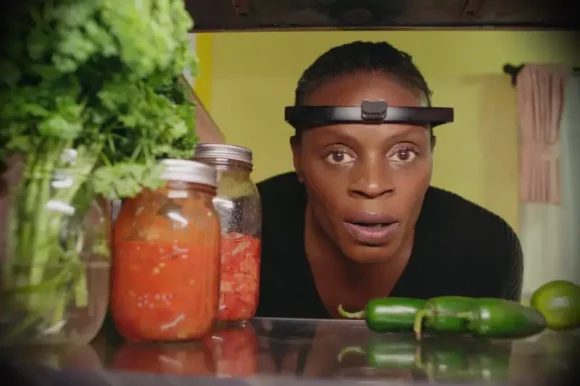Watching Mika Rottenberg and Mahyad Tousi’s Remote for New Scientist, 26 October 2022
From her high-rise in a future Kuala Lumpur, where goods flow freely, drone-propelled, while people stay trapped in their apartments, Unoaku (in a brilliant, almost voiceless performance by Okwui Okpokwasili) ekes out her little life. There are herbs on her windowsill, and vegetables growing in hydroponic cabinets built into her wall. If she’s feeling lazy, a drone will deliver her a meal that she can simply drop, box and all, into boiling water. Unoaku’s is a world of edible packaging and smart architecture, living rugs (she spritzes them each day) and profound loneliness. Unoaku lives alone — and so does everybody else.
Though Remote was filmed during the Covid-19 lockdowns, it would be a mistake to consider this just another “lockdown movie”. Unoaku’s world is by no stretch a world in crisis, still less a dystopia. Her vibrantly decorated apartment (I want her wallpaper and so will you) is more refuge than prison, its walls moving to accommodate their occupant, giving Unoaku at least the illusion of space. Had it not been for Covid, we would probably be viewing this woman’s life as a relatively positive metaphor for what it would be like to embark on a long space journey. One imagines Lunar or Martian settlers of the future settling for much less.
Hers is, however, a little life: reduced to self-care, to hours spent gesturing at a blank wall (she’s an architect, working in VR), and to evenings sprawled in front of Eun-ji and Soju, a Korean dog-grooming show (Soju is the terrier, Eun-ji (Joony Kim) its ebullient owner).
Then things start to go very slightly wrong. Unoaku’s pan is returned dirty from the cleaning service. Eun-ji turns up drunk to her live show. Unoaku notices that the goofy clock on Eun-ji’s wall has started to run backwards. When she points this out on the chat platform running beside the programme, she triggers a stream of contempt from other viewers.
Unoaku is far more fragile that we thought. Now, when she leans out her window, bashing her cooking pan with a wooden spoon, celebrating — well, something; maybe just the fact of being alive and being able to hear other human beings — she is left shaking, her face wet with tears.
Soon other women are contacting her. They too have been watching Eun-ji and Soju. They too can see the clock going backwards on the dog-groomer’s wall. Bit by bit, a kind of community emerges.
Commissioned by the arts non-profit ArtAngel in the UK and a consortium of international galleries, Remote is that rare thing, an “art movie”. It belongs to a genre that became economically unviable with the advent of streaming and has been largely forgotten. (“Where are today’s Peter Greenaways and Derek Jarmans?” is a question that may not even compute for some readers, though these figures towered over the “arts & ents” pages of decades past.)
Director Mika Rottenberg, an artist working in upstate New York, is best known for her short, cryptic, funny video works like Sneeze (2012), in which well-dressed men with throbbing noses sneeze out live rabbits, steaks and lightbulbs. Her co-director Mahyad Tousi has a more mainstream screen background: he was the executive producer of CBS primetime comedy United States of Al and is currently writing a sci-fi adaptation of The Tales from a Thousand and One Nights.
One can’t expect this pair to revive the art movie overnight, of course, but Remote offers up an excellent argument for making the attempt. Like a modern Japanese or Korean short story, Remote explores the tiny bounds of an ordinary-seeming urban life, hemmed in by technology and consumption, and it surprises a world of deep feeling bubbling just beneath the surface.

